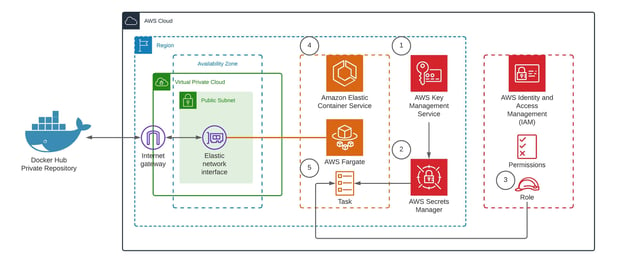Different personality types are better suited for different careers, and that's okay! Choosing to become a DevOps Engineer is a big choice and you should consider the skills necessary to be successful and the job titles/requirements in the field to determine if it's right for you. It's like being a firefighter in the software world - it's not for everyone, but it's for some and they love it. Sometimes individual work, sometimes team work.
DevOps can be a rewarding career choice for individuals who have a passion for both software development and IT operations. If you find yourself interested in the following aspects, DevOps might be a suitable career path for you:
- Bridging development and operations:
If you enjoy working at the intersection of software development and IT operations, DevOps offers an opportunity to bridge these areas. You will have the chance to collaborate with both development and operations teams, understanding their needs and finding solutions that align with both sides. - Automation and efficiency:
If you are passionate about automation and finding ways to streamline processes, DevOps is a great fit. DevOps emphasizes automating repetitive tasks, deploying applications efficiently, and optimizing workflows, resulting in increased efficiency and reduced manual effort. - Continuous learning and improvement:
DevOps is a dynamic field that requires individuals to continuously learn and adapt to new technologies, tools, and practices. If you enjoy staying up-to-date with industry trends, experimenting with new tools, and continuously improving processes, DevOps provides ample opportunities for growth and learning. - Problem-solving and troubleshooting:
DevOps Engineers often face complex challenges in managing infrastructure, deploying applications, and resolving issues. If you enjoy problem-solving and troubleshooting, DevOps will provide you with opportunities to apply your analytical skills and find solutions to technical problems. - Collaboration and communication:
Collaboration and effective communication are crucial in the DevOps culture. If you enjoy working in cross-functional teams, collaborating with developers, operations personnel, and other stakeholders, and are skilled at fostering effective communication, DevOps can provide a suitable career environment. - Agility and adaptability:
DevOps embraces agility and the ability to adapt to changing requirements and technologies. If you thrive in fast-paced environments, enjoy working on multiple projects simultaneously, and can quickly respond to evolving needs, DevOps offers an environment that values these qualities.
It's important to note that a career in DevOps requires continuous learning and the willingness to embrace new technologies and practices. It's beneficial to gain a solid understanding of software development principles, system administration, and networking concepts, as well as familiarize yourself with tools and technologies commonly used in the DevOps space.
By acquiring the necessary skills, certifications, and experience, you can establish a successful career as a DevOps Engineer or in related roles such as DevOps Consultant, Site Reliability Engineer (SRE), or Cloud Engineer. According to Glassdoor, “The national average salary for an Entry Level DevOps Engineer is $90,868 per year in the United States.”

How Do I Become a DevOps Engineer?
The path to become a DevOps engineer may look different from person to person, but always includes a form of technical training. This includes understanding the basic computer science fundamentals such as data structures, data types, and databases. If you are brand new to programming and the field of development and tech in general, this training may take longer or look different than others. If you are switching (LINK?) from an industry like accounting, recruiting, or healthcare, you could capitalize on your transferable skills for a seamless transition. Then, you’ll get into deployment, CI/CD, and understanding cloud landscape, common cloud tools, and core serverless tools. Also, Terraform and virtual machines will be a large component of the curriculum for any DevOps/Cloud training. Finally, before landing your first job as a DevOps engineer, you’ll want to career-prep with practicing your technical interviewing skills and fine-tuning your technical portfolio. Some of the main steps to become a DevOps Engineer are detailed below:
- Gain a strong foundation in software development:
DevOps is the intersection of development and operations, so it's important to have a solid understanding of software development principles, coding, and version control systems. Learn programming languages such as Python, Java, or Ruby, and familiarize yourself with tools like Git. - Learn about system administration and networking:
DevOps Engineers need to have knowledge of system administration and networking concepts. Gain experience with Linux/Unix systems, understand how to set up and configure servers, and learn about network protocols and security. - Understand automation and infrastructure as code (IaC):
DevOps emphasizes automation and treating infrastructure as code. Learn about configuration management tools like Ansible, Puppet, or Chef, and explore infrastructure provisioning tools like Terraform or CloudFormation. - Familiarize yourself with cloud platforms:
Cloud computing is a fundamental aspect of modern DevOps practices. Gain experience with popular cloud platforms such as Amazon Web Services (AWS), Microsoft Azure, or Google Cloud Platform (GCP). Learn how to deploy and manage applications in the cloud. - Explore containerization and orchestration:
Containerization technologies like Docker and container orchestration platforms like Kubernetes are widely used in DevOps. Learn how to containerize applications, manage containers, and deploy them using orchestration tools. - Gain experience with continuous integration and continuous deployment (CI/CD) pipelines: DevOps emphasizes the automation of software delivery pipelines. Familiarize yourself with CI/CD concepts and tools like Jenkins, GitLab CI/CD, or Travis CI. Learn about building, testing, and deploying applications in an automated and reliable manner.
- Develop collaboration and communication skills:
DevOps Engineers work closely with development, operations, and other teams. Effective communication, collaboration, and teamwork are crucial for success in this role. Improve your interpersonal skills and learn to work effectively in cross-functional teams. - Stay updated with industry trends and best practices:
DevOps is a rapidly evolving field, so it's essential to stay up-to-date with the latest trends, tools, and best practices. Follow blogs, attend conferences, join relevant communities, and participate in online forums to expand your knowledge. This sounds cliché, but in the world of DevOps, things really do change quickly, meaning DevOps engineers are constantly learning. - Gain practical experience:
Hands-on experience is invaluable for becoming a DevOps Engineer. Look for opportunities to work on real-world projects, either through internships, open-source contributions, or personal projects. Building a portfolio of projects can help demonstrate your skills and expertise to potential employers. - Pursue certifications (optional): Although not mandatory, certifications can validate your knowledge and enhance your credentials. Consider obtaining certifications such as AWS Certified DevOps Engineer, Google Cloud DevOps Engineer, or Certified Kubernetes Administrator (CKA).

Becoming a DevOps Engineer at Qwasar
The path to become a DevOps Engineer at Qwasar begins with a preseason data that covers the basic software engineering principles in a format equivalent to a coding bootcamp. This includes variables, functions, loops statements, if statements, basic algorithms, and data structures. You will begin using an IDE and the terminal, as well as Python. Following the preseason, you enter Season 1 Arc 1 which covers fundamental computer programming concepts and the basics of C. You will build a solid foundation in back-end programming including pointers, arrays, strings, algorithms, data structures, data types, and software architecture. Then, Season 2 will involve web architecture and setup, including using DNS, AWS/GCP/Azure, web hosting, scripting and monitoring systems, web servers and configurations, virtual machines, and finally, different types of databases (SQL, noSQL, Redis). Season 3 will cover software architecture and infrastructure that’s scalable and robust, databases, web databases, Docker, Kubernetes, virtual machines, logs, CI/CD, Terraform, Puppet, Ansible, Chef, Jenkins, network programming, and code automation in a public IaaS cloud infrastructure. Finally, Season 4 involves a final program project that aligns with the industry in which they want to get a job. The project must be about 3 months in duration and of significant technical difficulty. You will also contribute to open source projects.
This curriculum is intentionally designed and specifically structured to ensure learner success through competency based learning methods.
Program managers facilitate learning at Qwasar to ensure each learner is meeting progress markers in their track and getting through blockers in their projects. The community is worldwide and readily available through our Discord platform. Learners engage in all meetings and are able to work on projects with their peers. When you get stuck on something, we have guardians who are available to mentor and assist you through the tougher aspects of projects and tasks. There are many support resources available on Discord and Upskill as well. We help you develop your technical skills so that you can build a stellar technical portfolio throughout the program. In the final season, you will fine-tune your technical portfolio for technical interviews with extensive technical interviews, resume reviews, and profile training/resources. In addition to our industry-leading coding and learning management platform, learners have access to a hugely diverse and welcoming learning community and our alumni network for referrals to jobs.
If you are interesting in learning more about our DevOps program: https://qwasar.io/tech-talent-programs/devops-and-cloud-engineer-program/
If you would like to register for an information session (live or on-demand):
https://learn.qwasar.io/qwasar-program-information-session-
If you are ready to apply to our DevOps program:
https://qwasar.io/application/
If you would like to contact us to learn more or speak with a program manager:
https://qwasar.io/about-software-engineering-school/contact-qwasar/


